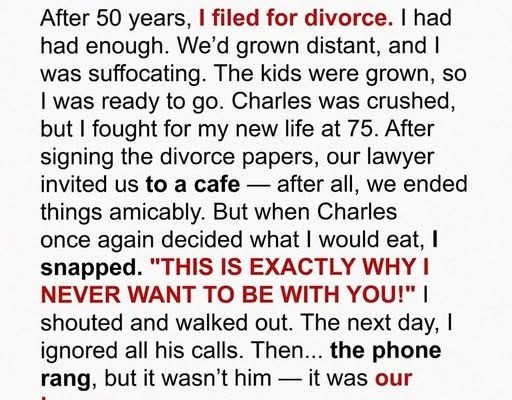The conversation that followed was the hardest of their lives, raw with unspoken resentments and profound sorrow for what was being lost. They talked for hours, not in anger, but in a weary recognition of their divergent futures. Rhys spoke of the monumental opportunity, the pinnacle of his career that he couldn’t abandon. Elara spoke of the life they had, the children who needed a present parent, the quiet dignity of their shared home that she couldn’t uproot. Neither was truly wrong, but they were no longer walking the same road.
The separation was amicable, heartbreakingly so. They explained it to Leo and Clara as a difficult but necessary evolution, assuring them of their unwavering love, though the children’s confused and hurt faces mirrored the ache in Elara’s own heart. Rhys moved his remaining belongings out of the house, a process that felt like dismantling decades of memories, piece by painful piece. The photographs on the mantel, the worn armchair where they’d read together, the kitchen table scarred with homework and family meals – each object silently testified to a lifetime now irrevocably altered.
Months turned into a year. Elara poured herself into her work and her children, finding solace in the routines she had once shared. She started sketching again, not cityscapes, but intricate mandalas, each line a meditation on resilience and self-discovery. She reconnected with old friends, went to art classes, and slowly, cautiously, began to build a new life for herself, one that didn’t revolve around the presence of Rhys.
Rhys, on the other hand, thrived in his new city, his project a resounding success, earning him accolades and further recognition. He became a titan in his field, his name whispered with respect in architectural circles. Yet, when he called the children, his voice sometimes held a tremor of wistfulness. He missed the quiet rhythm of their old life, the familiar comfort of Elara’s presence. The glittering skyline he had helped create sometimes felt like a lonely monument to a choice that had cost him more than he had anticipated.
One day, Elara received an invitation to a gallery opening. It was for a new exhibition featuring the work of a renowned architect, his latest urban masterpiece. Rhys. She hesitated, then decided to go. She dressed carefully, a quiet confidence radiating from her.
She found him by a large rendering of his award-winning building, talking animatedly with a group of admirers. He looked older, distinguished, but his eyes, when they met hers across the crowded room, still held that familiar flicker of recognition, followed by a profound sadness. He excused himself and walked towards her.
“Elara,” he said, his voice a little hoarse. “You came.”
“It’s an incredible achievement, Rhys,” she replied, genuinely. She looked at the towering structure in the rendering, a testament to his ambition, his genius. “You built your dream.”
He looked from the rendering to her, then back to the image. A long silence stretched between them, filled with the hum of the crowd and the weight of their separate paths. “Yes,” he finally said, his gaze fixed on the magnificent building. “But I realized, too late, that I built it alone.”
Elara offered a small, sad smile. “Some choices,” she said softly, “change everything.”


